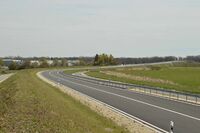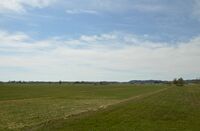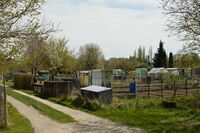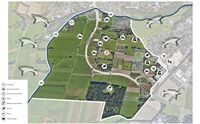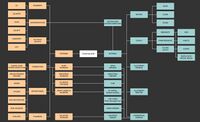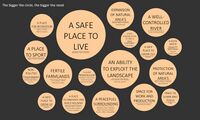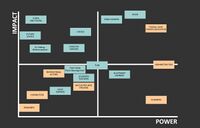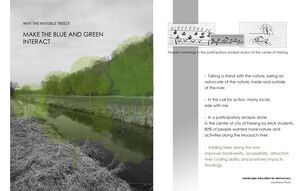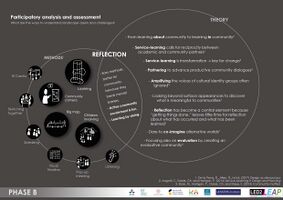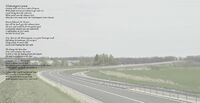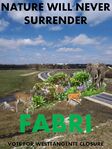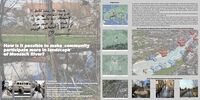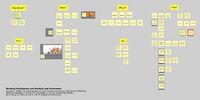Freising-Moosach Landscape Democracy 2022 Team 3
>>>back to working groups overview
For help with editing this Wiki page use this link.
For more details on assignments and key readings please use this link.
Landscape Democracy Rationale
- Why do you think this case is relevant? What is your hypothesis considering the landscape challenges?
- South-west Freising is relevant because of the clear challenges the community faces. This area faces climate change at first hand, through being a flood risk zone. The building of the "Westtangente" is a very controversial issue for the local community, also the city of Freising is taking steps in expanding through this area.
Location and Scope
- You can edit this map with the map editor
Phase A: Mapping Your Community
Welcome to Your Community and Their Landscape
- The project area is divided by the road "Westtangente" that has been finished in January 2022. The eastern part is characterized by an open agricultural landscape bordered by the "Moosach" river, whereas the western part has a small-scale landscape with different uses. These different uses result in different stakeholders that are in the area.
Groups of Actors and Stakeholders in Your Community
- As you may see in the map below, there are different stakeholders in this area, both internal and external. In internal stakeholders, there are a few trends visible. There are the residential areas in North, the industrial actors in South-East, the farmers being mostly to the West and the scattering of allotments which mix internal and external stakeholders.
Relationships Between Your Actors and Groups
- In the maps below, you may see the connection and division of the stakeholders, as well as their needs and interests and the power and impact each stakeholder possesses.
Summary of Your Learnings from the Transnational Discussion Panel
- The Transnational Discussion Panel was very useful and interesting in terms of the different approaches and methods that each group applied for their own project area. The major difference between the groups was the scale each-one of us used to specify the challenges. What we have learned and what we will use in the next procedures is looking into the powerful stakeholders more. This way, evaluate the political actors more in a larger scale.
Theory Reflection
- The reading list and lectures as part of this module were useful to realize how important the role of democratic programs is in the landscape and how to implement this. In particularly, understanding our rule as "interlocutors' and bridge-makers between science and society. Also the lectures by Sonja Hörster have been useful to use the methods correctly.
References
- Google maps; Council of Europe:The European Landscape Convention, 2000; LED Team:Landscape Education for Democracy, 2019; Disorientation as a Learning Objective, Journal of Planning Education and Research, 2020
Phase B: Democratic Landscape Analysis and Assessment
Gentiane Thaci "Make the blue and green interact"
Kees van Roon "Westtangente poem"
Fabrizio Albion "Westtangente Closure"
Delaram Kouhestani "Analysis of Moosach Waterscape, Community-Engaged Design"and "Get to Know Communities, Reading Participatory Analysis and Assessment, Phase02"
Phase C: Collaborative Visioning and Goal Setting
The Scene in Your Story of Visioning
- insert text here
- Addyouruniqueimagename.jpg
insert text here
- Addyouruniqueimagename.jpg
insert text here
- Addyouruniqueimagename.jpg
insert text here
The Actors in Your Story of Visioning
- insert text here
- Addyouruniqueimagename.jpg
insert text here
- Addyouruniqueimagename.jpg
insert text here
- Addyouruniqueimagename.jpg
insert text here
The Story of Visioning
- insert text here
- Addyouruniqueimagename.jpg
insert text here
- Addyouruniqueimagename.jpg
insert text here
- Addyouruniqueimagename.jpg
insert text here
Reflect on Your Story of Visioning
- insert text here
- Addyouruniqueimagename.jpg
insert text here
- Addyouruniqueimagename.jpg
insert text here
- Addyouruniqueimagename.jpg
insert text here
Phase D: Collaborative Design, Transformation and Planning
Your Prototyping Action
- insert text here
- Addyouruniqueimagename.jpg
insert text here
- Addyouruniqueimagename.jpg
insert text here
- Addyouruniqueimagename.jpg
insert text here
The Evolution of Your Prototyping Action
- insert text here
- Addyouruniqueimagename.jpg
insert text here
- Addyouruniqueimagename.jpg
insert text here
- Addyouruniqueimagename.jpg
insert text here
The Plan Behind Your Prototyping Action
- insert text here
- Addyouruniqueimagename.jpg
insert text here
- Addyouruniqueimagename.jpg
insert text here
- Addyouruniqueimagename.jpg
insert text here
The Realization of Your Prototyping Action
- insert text here
- Addyouruniqueimagename.jpg
insert text here
- Addyouruniqueimagename.jpg
insert text here
- Addyouruniqueimagename.jpg
insert text here
Reflect on Your Prototyping Action
- insert text here
- Addyouruniqueimagename.jpg
insert text here
- Addyouruniqueimagename.jpg
insert text here
- Addyouruniqueimagename.jpg
insert text here
Phase E: Collaborative Evaluation and Future Agendas
Collaborative Evaluation and Landscape Democracy Reflection
- insert text here
- Addyouruniqueimagename.jpg
insert text here
- Addyouruniqueimagename.jpg
insert text here
- Addyouruniqueimagename.jpg
insert text here
The Actors in your Collaborative Evaluation
- insert text here
- Addyouruniqueimagename.jpg
insert text here
- Addyouruniqueimagename.jpg
insert text here
- Addyouruniqueimagename.jpg
insert text here
Reflection on the Online Seminar
- insert text here
- Addyouruniqueimagename.jpg
insert text here
- Addyouruniqueimagename.jpg
insert text here
- Addyouruniqueimagename.jpg
insert text here
Reflection on your Living Lab Process
- insert text here
- Addyouruniqueimagename.jpg
insert text here
- Addyouruniqueimagename.jpg
insert text here
- Addyouruniqueimagename.jpg
insert text here
Your Living Lab Code of Conduct
- insert text here
- Addyouruniqueimagename.jpg
insert text here
- Addyouruniqueimagename.jpg
insert text here
- Addyouruniqueimagename.jpg
insert text here
Process Reflection
- insert text here

